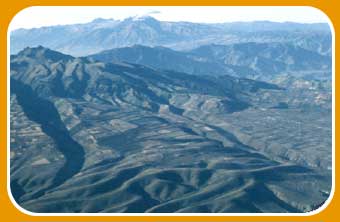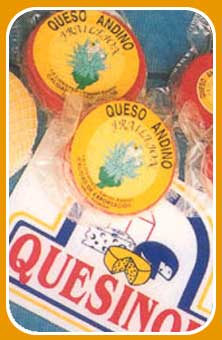| |
Ecuador is one of South
America's poorest countries. But aid has enabled local people
to start up a booming business in cheese-making in the Sierra
Norte, a mountainous region in the north. By working together
to help themselves, local people are now reaping the benefits
of sustainabledevelopment
and escaping a life of poverty.
To
record the main ideas in this case study
 to
download a sheet for you to print out and fill in. to
download a sheet for you to print out and fill in. |

©Simon Scoones/Worldaware |
The Sierra Norte
is part of the Andean mountain range close to the equator.
Here, the land ranges from 2,000 to 4,000 metres above
sea-level. |
Barriers to development
Many people in the Sierra Norte make a living from rearing
cattle on the mountain slopes to produce milk and cheese.
But poverty is widespread. Poor roads have meant that small
farmers have limited opportunities to sell their milk, which
was sometimes sour by the time it reached a buyer. Meanwhile,
deforestation has caused widespread soil erosion, degrading
the land.
A future in cheese
In 1996, eight local farmers put together a plan to improve
the local economy focusing on cheese. They borrowed money
from the Belgian government to build 13 modern cheese-making
factories. Now local farmers have a guaranteed market for
their milk, and the factories process two million litres of
milk a year.
Working together
 |
To run the cheese-making
business, over a thousand farmers and their families are
members of a co-operative
called Quesinor. A typical member of Quesinor has about
three cows, producing nine litres of milk a day. But as
part of a large co-operative,
farmers can access new, bigger markets, which would be
impossible for individual farmers. Today, Quesinor cheese
is sold not just locally. By investing in better transport,
the cheese can reach Ecuador's cities like Quito and Guayaquil,
and even Colombia. Quesinor now sells about £25,000
worth of cheese every month. Farmers have spent some of
Quesinor's profits on improving their farming techniques
and looking after their land. Cattle herds are now penned
in fields with barbed wire or electric fencing to control
grazing, and 40 hectares of trees have been planted to
stop soil erosion in the long-term. Quesinor even runs
its own bank. This way, people can borrow money at low
interest rates to develop their farms. |
Wider benefits
Thanks to Quesinor, farmers are enjoying a better quality
of life. They have fewer debts than before, and they have
water, electricity and television in their homes. Their children
can go to school because their parents no longer need them
to earn extra money for the family. The rest of the Sierra
Norte community benefits too. Gustavo Tuquerres, a member
of Quesinor commented, "villages with cheese plants now
have better transport and roads, health centres, drainage
systems and better schools".
An optimistic future
With the business well established, Quesinor farmers are finding
ways to expand. The experienced cheese-makers are training
other members of their community to bargain with supermarkets
and other buyers to ensure a good price for Quesinor cheese.
The co-operative
is also looking into ways of joining forces with other cheese-making
businesses in Ecuador. Through self-help, collective decision-making
and a focus on sustainable
development, Quesinor is making a lasting difference to the
people of the Sierra Norte.
|
|





